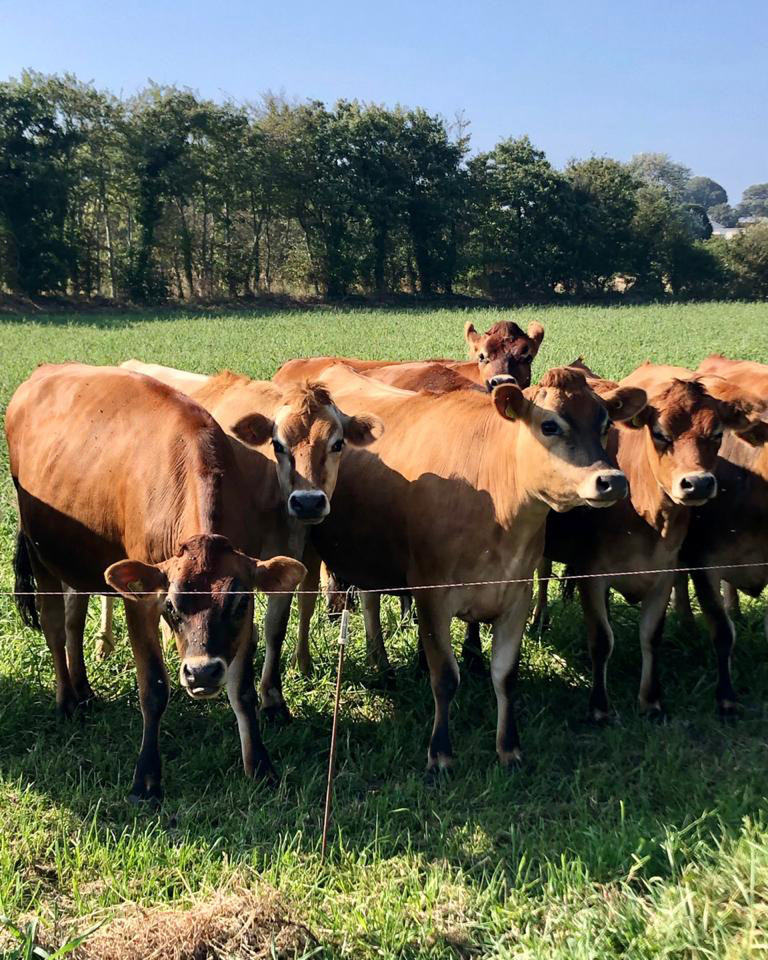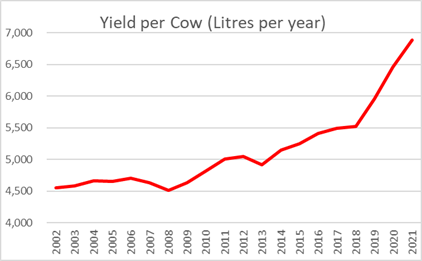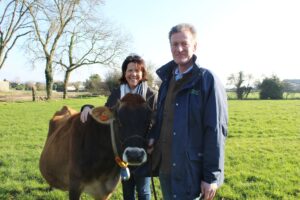

This year represents some ten years since the first crop of heifers bred by imported bulls completed their lactations, and real results of the historic decision in 2008 to allow the importation into Jersey of bovine semen could be seen on the ground. This decision enabled cattle breeders in the island access to the best pedigree Jersey genetics from around the world to blend with the unique population of pedigree Jersey cattle in their island home.
A decade on and the effect becomes more apparent as each year passes due to the cumulative and compounding effect of genetic gain. The graph below, of average yield per cow per year across the island population, shows an impressive gain in yield of 46%, and rising, when comparing 2021 against the three year average up to 2008.

Dairy farmers in the island should be applauded for having successfully deployed genetics along with enhanced management techniques to significantly improve production efficiency on farm. By way of illustration, the industry is producing a similar volume of milk today as ten years ago, but with one third fewer cattle.
Cattle breeding is a long term business and the development of the Jersey breed, under the guidance of this Society over the last 190 years, is a testament to the dedication and investment of generations of dairy farmers. Breed development is based on information, and the Jersey Herd Book, established in 1866, is the foundation upon which enormous amounts of data are collected, analysed and interpreted for cattle breeders to use in their breeding decisions.
One would think that with such gains in productivity all must be well down on the dairy farm? Unfortunately, however, a succession of turbulent events over the last decade which have rolled in like a series of Atlantic storms; Brexit, Covid and now the Ukraine are taking their toll. Whilst this dreadful war is raging 3,000 kilometres away, the disruption to agricultural supply chains affects us here and now.
As I write this, agricultural input cost inflation is running at 30% in the UK, and locally some costs are up by as much as 50% in a matter of months. This will inevitably lead to unwelcome increases food prices for consumers at a time of rising inflation. Those who have espoused the view that we can always buy cheap food from abroad will be disappointed to learn that in these difficult times a number of countries are starting to impose export bans as they look to divert food supplies to their domestic populations in an attempt to curb food price inflation at home, and avoid the civil unrest seen during the ‘Arab spring’ in 2011.
Although a relatively small proportion of global agricultural production is traded internationally, it only takes a small percentage disruption in supply to have a large effect on global prices, which in turn influence domestic prices, and this multiplier effect creates further volatility. For example, around the time we were first importing international genetics world dairy prices doubled in a year as a result of a shortfall in supply of just 0.3%.
Food shortages are not something that we, in Europe, have had to think about too much in many years, but Emergency Planning Officers talk of the breakdown of civil society after the loss of nine meals, in other words when there is no food for three days. Supply chains are finely balanced as we know only too well living on an island. Talk of self-sufficiency is not the answer, but we must seek greater self-reliance and resilience.
Looking a decade ahead, hopefully beyond the current difficulties, we must not forget that the next generation of farmers need to be encouraged into the industry. I have no doubt that there are many able young people who would relish a career in agriculture, but the entry barriers are daunting.
In the dairy industry, currently, we are fortunate to have a cadre of young farmers who are well trained, highly professional and very motivated, but most have entered into established family businesses. We need to be considering now, both how to enable new entrants and facilitate the transfer of businesses between generations.
President Eisenhower famously said “farming looks mighty easy when your plough is a pencil and you’re a thousand miles from the corn field.” Farming is facing some extraordinary challenges, and it will take such wisdom, vision and collaboration on the part of industry leaders and government to ensure that agriculture in Jersey thrives long into the future.





One Response
Dear Sir
‘When the last tree has been cut down, the last fish caught, the last river poisoned, only then will we realize that one cannot eat money’
The above famous quotation could be changed slightly to fit this island:
‘When the last field is built on, only then will we realise that you can’t eat concrete or money’…n’est pas?
I understand there is a finely balance of needs on the island but we have too many of the wrong people living here, who have no interest in the island as a whole & so far our government have only seemed to follow the money, with the awful mess we now find ourselves in!
Good luck in pursuing the job you & others are doing, I wish you well & yes, encourage youngsters who would love to be in agriculture, who unfortunately are not born into it.
From a good old country girl,
Jennie